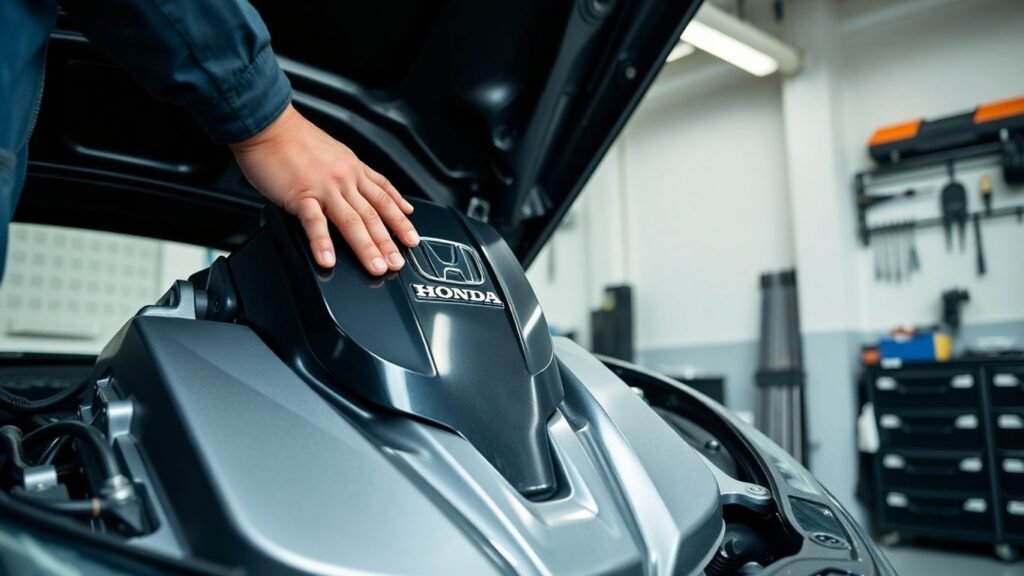So, you’ve got a Honda and you want to keep it running like a dream. That means finding folks who really know their stuff when it comes to Honda engines. It’s not always easy to find the right people, but it’s super important for your car’s health. We’re talking about the mechanics who specialize in these engines, the real Honda engine specialists. They’re the ones who can spot a small issue before it becomes a big, expensive problem.
Key Takeaways
- Look for mechanics who are certified or factory-trained for Honda engines.
- Good Honda engine specialists use genuine Honda parts for repairs.
- Regular maintenance and diagnostics are key to keeping your Honda running well.
- Check reviews and ask about warranties when choosing a repair shop.
- Specialists can help optimize your engine’s performance and efficiency.
Finding Expert Honda Engine Specialists
Why Choose Certified Honda Engine Specialists
When it comes to your Honda, especially its engine, you want someone who really knows their stuff. Going with a certified specialist means you’re getting technicians who have been trained directly by Honda. They understand the ins and outs of your specific engine model, from the latest Civic to an older Accord. This specialized knowledge is a big deal because Honda engines have their own unique designs and quirks. A certified tech will have access to the latest training and information directly from the manufacturer, which can make a real difference in how well your car is serviced.
What to Expect from Top Honda Engine Specialists
When you find a top-notch Honda engine specialist, you can expect a clear and honest approach to your car’s care. They should be able to explain what’s going on with your engine in plain language, without all the confusing technical terms. You’ll likely get a detailed breakdown of any recommended services or repairs, often with options if available. A good specialist will also be transparent about pricing before starting any work. You might also see them using specific diagnostic tools designed for Hondas, and they’ll probably use genuine Honda parts unless you agree to something else. It’s about getting your car fixed right, the first time, with no surprises.
The Benefits of Genuine Honda Parts
Using genuine Honda parts is a big plus when getting your engine serviced. These parts are made by Honda, specifically for your car model. This means they’re designed to fit perfectly and work exactly as intended with your engine’s other components. Think of it like using the right key for a lock – it just works better. While aftermarket parts might seem cheaper, genuine parts often last longer and perform more reliably, which can save you money and hassle in the long run. Plus, using them can help keep your Honda running like it did when it was new, and it often helps maintain the vehicle’s resale value.
Key Services Offered by Honda Engine Specialists
Comprehensive Engine Diagnostics
When your Honda’s engine starts acting up, the first step is figuring out exactly what’s wrong. Top specialists use advanced tools to pinpoint issues. This isn’t just about plugging in a scanner; it involves a deep look at the engine’s systems. They check everything from fuel delivery to exhaust emissions, looking for even small problems before they get bigger.
Engine Repair and Rebuilding
Once a problem is found, the specialists get to work fixing it. This can range from replacing a faulty sensor to a full engine rebuild. If an engine has seen better days, a rebuild can bring it back to life, making it run like new again. This process involves taking the engine apart, cleaning or replacing worn parts, and putting it all back together with precision.
Routine Engine Maintenance
Keeping your Honda’s engine in good shape means regular check-ups. This includes things like oil changes, filter replacements, and checking fluid levels. Following the manufacturer’s recommended maintenance schedule is key to preventing major issues down the road.
Regular maintenance is like giving your engine a regular check-up. It helps catch small things before they turn into big, expensive problems. Think of it as preventative care for your car.
Here’s a look at some common maintenance tasks:
| Service Type | Frequency Recommendation |
|---|---|
| Oil and Filter Change | Every 5,000-7,500 miles |
| Air Filter Replacement | Every 15,000-30,000 miles |
| Spark Plug Replacement | Every 60,000-100,000 miles |
| Coolant Flush | Every 30,000-50,000 miles |
What Sets Honda Engine Specialists Apart
Factory-Trained Technicians
When you’re looking for someone to work on your Honda, you want to know they really know their stuff. That’s where factory-trained technicians come in. These are the folks who have gone through specific training directly from Honda. They learn the ins and outs of Honda engines, from the newest models to older ones. They understand the unique way Honda designs its engines, which can be pretty different from other car brands. This specialized knowledge means they’re less likely to guess and more likely to pinpoint the exact problem quickly. It’s like having a doctor who specializes in a specific area of medicine – they just have a deeper, more focused understanding.
Advanced Diagnostic Equipment
Modern cars, especially Hondas, are packed with complex computer systems. To figure out what’s going on under the hood, you need more than just a good ear and a wrench. Top Honda specialists use advanced diagnostic tools. These machines can plug into your car’s computer and read error codes, monitor sensor data in real-time, and even test different engine components. It’s like giving your car a full physical with the latest medical technology. This equipment helps them see things that aren’t obvious from just looking at the engine, leading to more accurate diagnoses and preventing unnecessary repairs.
Commitment to Quality Service
What really makes a difference is a shop’s dedication to doing the job right. This means using quality parts, often genuine Honda parts, which are designed specifically for your vehicle. It also means taking the time to do the repair properly, not just a quick fix. You’ll often find that these specialists stand behind their work with guarantees or warranties on both parts and labor. They want you to be happy and trust them with your car. It’s about building a relationship where you know your Honda is in good hands, every time you visit.
A good mechanic will explain what’s wrong in a way you can understand. They won’t just hand you a bill; they’ll show you why certain parts need replacing and what the options are. This transparency builds trust and makes you feel more in control of your car’s care.
Ensuring Your Honda’s Longevity

Keeping your Honda running well for a long time is all about staying on top of a few key things. It’s not rocket science, but it does take a bit of attention. Think of it like taking care of yourself – you feel better and last longer when you eat right and get enough sleep. Your car is similar.
Preventative Maintenance Schedules
Honda provides recommended service intervals for a reason. These aren’t just suggestions; they’re based on how the engine and its parts wear down over time. Following these schedules means you’re addressing potential issues before they become big, expensive problems. It’s about catching things early. For example, changing your oil and filter at the recommended mileage prevents sludge buildup that can choke your engine. Similarly, replacing spark plugs at the right time keeps your engine running smoothly and efficiently.
Understanding Your Honda’s Needs
Every Honda model has its own specific needs. What works for a Civic might not be exactly what a CR-V requires. A good specialist will know these differences. They understand that different engines might need specific types of oil, or that certain transmissions have unique service requirements. Paying attention to your car’s dashboard warning lights is also part of this. That little check engine light isn’t just for show; it’s your car telling you something needs a look.
The Importance of Regular Check-ups
Beyond the scheduled maintenance, regular check-ups are a good idea. These are often shorter visits where a mechanic can give your car a quick once-over. They might spot a small coolant leak that could turn into a major overheating issue, or notice a worn belt that’s close to snapping. It’s like a doctor’s annual physical for your car. These quick inspections can save you a lot of headaches and money down the road.
Sticking to a maintenance plan isn’t just about fixing things when they break. It’s about preventing them from breaking in the first place. This proactive approach means your Honda will likely run better, be more reliable, and hold its value longer. It’s a smart way to look after your investment.
Choosing the Right Honda Engine Specialist
Finding someone who really knows Honda engines can feel like a big deal. You want a place that’s not just going to slap a part on and send you out the door. It’s about trust and making sure your car gets the care it needs to keep running well for years. So, how do you pick the right shop?
Researching Local Specialists
Start by looking around your area. See which shops specialize in Hondas or have a strong reputation for working on them. A quick online search can show you who’s out there. Pay attention to places that mention factory-trained technicians or have specific Honda certifications. It’s a good sign they’re serious about the brand.
Reading Customer Reviews
What are other Honda owners saying? Online reviews can give you a real peek into how a shop operates. Look for comments about honesty, the quality of work, and how well they communicate. If you see a lot of people mentioning good experiences with engine work specifically, that’s a positive indicator. It’s also helpful to see how they handle complaints, if any pop up.
Sometimes, a shop might quote you one price, but the final bill ends up being much higher. It’s good to find a place that gives you a clear estimate upfront and sticks to it. Asking about this before you agree to any work can save you a headache later on.
Asking About Guarantees and Warranties
A solid guarantee or warranty on parts and labor is a strong sign of a shop’s confidence in their work. Don’t be afraid to ask what kind of warranty they offer. Most reputable shops will stand behind their repairs, usually for a set period or mileage. This protects you if something goes wrong shortly after you leave their bay. It shows they’re committed to doing the job right the first time.
Maintaining Peak Performance

Fluid Checks and Replacements
Keeping your Honda’s fluids topped up and clean is a big part of keeping the engine happy. Think of it like this: oil is the lifeblood of your engine, lubricating all those moving parts so they don’t grind themselves to dust. When it gets old and dirty, it just can’t do its job as well. That’s why regular oil changes are so important. But it’s not just oil. Your coolant keeps the engine from overheating, brake fluid helps you stop safely, and transmission fluid keeps the gears shifting smoothly. Skipping these checks can lead to some pretty serious and expensive problems down the road.
| Fluid Type | Recommended Interval (General) |
|---|---|
| Engine Oil | Every 5,000-7,500 miles |
| Coolant | Every 30,000-60,000 miles |
| Brake Fluid | Every 2-3 years |
| Transmission Fluid | Every 30,000-60,000 miles |
Addressing Noisy Brakes and Tires
Sometimes, performance issues aren’t directly related to the engine itself, but they can certainly affect how your car feels and handles. Strange noises from your brakes, like squealing or grinding, are a clear sign something needs attention. It could be worn brake pads, or maybe something more serious with the rotors or calipers. Similarly, odd sounds from your tires, like humming or thumping, might point to uneven wear, improper inflation, or even damage. Paying attention to these sounds is key to preventing bigger issues. Ignoring them could lead to reduced braking effectiveness or tire blowouts, which are definitely not good for performance or safety.
When you hear a new sound coming from your car, it’s usually best to get it checked out sooner rather than later. What might seem like a small issue now could turn into a much larger, more costly repair if left unaddressed. Think of it as an early warning system for your vehicle.
Optimizing Engine Efficiency
Getting the most out of your Honda’s engine isn’t just about power; it’s also about saving fuel and reducing wear and tear. A well-tuned engine runs smoother and uses less gas. This involves making sure things like spark plugs are in good condition, the air filter is clean so the engine can breathe properly, and the fuel system is free of any gunk. Modern Hondas have sophisticated computer systems that manage fuel injection and ignition timing. When these systems are working correctly, your engine will perform at its best, giving you that smooth acceleration and good mileage you expect from a Honda.
Wrapping It Up
So, finding the right Honda engine specialist is a big deal for keeping your car running well. It’s not just about fixing things when they break, but about getting good service that lasts. Whether you go with a dealership like Sherwood Honda, known for factory-trained techs and genuine parts, or a place like Caliber Automotive with its Red Seal-certified mechanics and clear digital inspections, the goal is the same: trust and quality. Even shops like Good News Auto and Bruce Stewart’s Auto Repair Centre focus on honest work and customer care, sometimes with extra perks like car care classes or community programs. Remember to look for shops that explain what they’re doing, use good parts, and stand behind their work. Taking a little time to find the right place means your Honda will thank you for it down the road.








